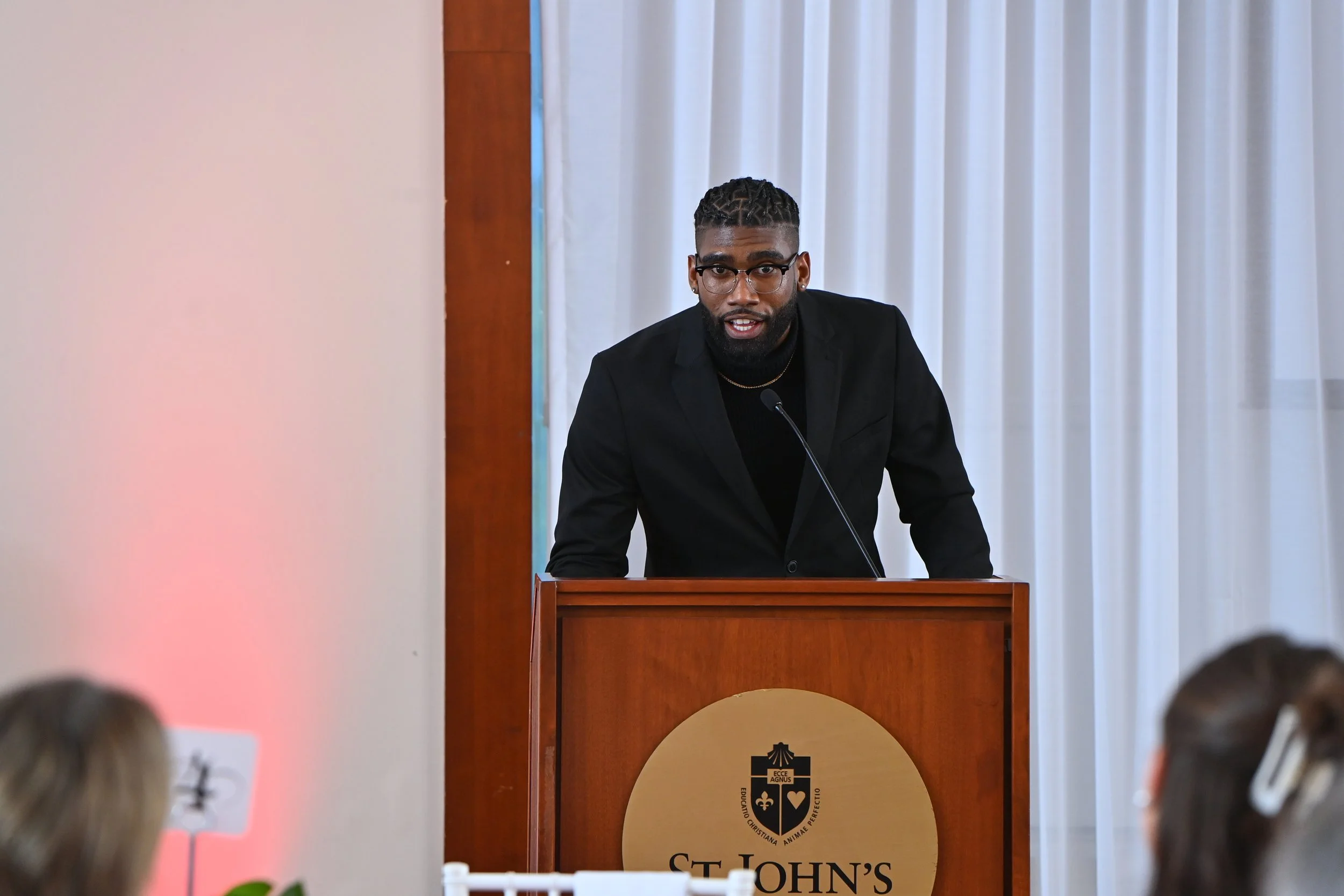Rule 11: UNDERSTAND YOUR AUDIENCE
“Before I speak, I pause. Before I speak, I pray.”
Before you speak, know who’s listening. Before you write, know who it’s for.
Season Two Begins Here
It’s been a month since I last shared a new rule. In that time, I realized I never actually said aloud what I was structuring silently: Season One concluded with Rule No. 10. And now, Season Two begins here—with Rule No. 11.
In that same month, I wrote two full poetry books for my newest trilogy, Embers of Light & Shadows. Book One carries the trilogy’s name, and Book Two is titled The House I Built From Ash. Sixty poems written across twenty-four days. And if I’m being honest, I believe this is my best work to date. Book Three is sitting with me quietly now. I won’t share the title just yet, but perhaps I’ll let you in when I write Rule No. 12.
Life outside of writing has been rich too. I was invited back to guest speak at St. John’s—my alma mater—and I’ve been helping to plan events for our alumni. I also spent just under two weeks with my mom, marking the first Mother’s Day we’ve spent together in eight years. That alone made the month feel holy. And, unexpectedly, I’ve begun teaching children’s church. That last one still surprises me. I never used to consider myself a teacher. But God seems to see something more.
And so, now that I’ve caught you up on what’s been unfolding between seasons, we begin again.
When I Spoke Just To Speak
There was a season in my life when I spoke simply to speak. Not because I didn’t have anything to say—but because I wanted to be someone to everyone. I believed that if I could just find the right words, and arrange them in the right order, I could crack open hearts that had long since sealed shut. Especially the ones like mine—sealed not from arrogance but as defense against rejection. I believed I could unlock doors I was never meant to enter, and fill rooms that weren’t built for me to inhabit. The rooms I chased because insecurity made me think I had to earn my belonging.
What I hadn’t yet learned was this: even the truest word will fall flat if it’s spoken in the wrong room. Even the most powerful message can be misinterpreted if you don’t understand the soul of the one you’re speaking to.
The Cost of Being Misunderstood
There is a grief in feeling unseen—I know that one well. But there’s another kind of grief, quieter and more corrosive, that comes when you offer your full self to someone who doesn’t have the ears to hear it. That grief lingers. It creates anxiety in the soul. And it can make you question your voice entirely.
Not every word needs to be said. Some truths need silence first.
Not every word needs to be said. Not every emotion needs translation. Sometimes feelings are just that—passing, flickering, impermanent. And sometimes what we believe is revelation is actually still being formed. Still being processed inside of us. Not every post is for public digestion. We already know this. We laugh and side-eye on social media when we see others overshare, but still forget the truth: not everything we feel is ready to be released.
Wisdom often shows up in the questions we forget to ask ourselves. Why am I saying this? What response am I hoping to get? Am I offering this because it’s true, or because I need to be affirmed?
There were moments when I only listened to respond. Moments I offered my ear just to get something in return. And there were moments I argued, not because I was right, but because I was afraid of what it would mean to be wrong. I’ve had to own all of that. And I’ve had to acknowledge that those patterns didn’t come from evil intent. They came from unhealed wounds—particularly the ones that made me feel unsafe in emotional intimacy. The healing work hasn’t been easy. It isn’t perfect. Some days the old triggers return like hairpins. But every day, healing remains a choice. And the more I choose it, the more I realize that maturity doesn’t mean having the right answers. It means being honest about what’s still hurting and refusing to speak from those places without discernment.
Jesus Knew The Room
Recently, I’ve been in different kinds of rooms. In some, I’ve been the mentor—someone ahead, someone steady, someone figuring it out in real time. In others, I’ve been the mirror—reflecting back parts of others they didn’t expect to see. And in some rooms, I’ve been the example of what not to do. But in all of them, I’ve had to read the room. Because every room listens differently.
Jesus read the room.
I’m learning to do the same.
When I think of what it means to truly understand an audience, I return to the example of Jesus. He knew how to read a room. He could speak to thousands in parables, and in the next breath offer a quiet word to a woman at a well that reached a wound no sermon ever could. When Mary met Him at the tomb of her brother Lazarus and said, “If you had been here, he wouldn’t have died,” He didn’t defend Himself. He didn’t explain. He wept. He met her where she was.
And the same man who wept was also the one who rebuked the Pharisees, who held silence before Pilate, who knew when to speak and when to be still. He understood the difference between behavior and burden. Between data and desperation. And He didn’t speak from a need to be heard. He spoke from clarity. From alignment. From love.
That’s the example I follow. And it’s what makes me wrestle with how often I’ve gotten it wrong.
Performers Want Applause,
Leaders Want Alignment
Performers preach to be seen. Leaders speak to be understood. There’s a difference. Performers want applause. Leaders want alignment. Performers seek attention. Leaders seek transformation. I’ve spent years unlearning the need to perform. And this year, more than any before, has asked me to show—not just say—that I’ve grown. I’ve learned to resist the urge to fill silence with sound. To stop speaking just to avoid being forgotten. Because silence used to terrify me. I didn’t know who I was in the absence of noise. But what I’ve found—especially in this quiet season of my life—is that impact rarely comes from broadcasting. It comes from discernment. From the sacred pause before you speak. From the breath before the sentence. From the moment when you ask not just, “What do I want to say?” but, “Who is this really for?”
Words are seeds. We all know this. We remember the words spoken over us—especially the painful ones—more vividly than the praise. But even the most powerful seed means little if the soil isn’t right. And we’re all soil. Sometimes we’re hardened. Sometimes we’re dry. Sometimes we’re shallow. Sometimes we’re ready. And we’ve all been all of them. So don’t scatter your legacy on hardened ground. Don’t plant covenant words in soil that is temporary. Don’t speak destiny into ears that only crave entertainment.
Understand your audience. Watch their patterns. Pay attention to their posture. Not to manipulate, but to minister. Because if the goal is just to be heard, applause will be enough. But if the goal is to truly reach, you’ll wait. You’ll discern. You’ll trust the Spirit. Some soil needs more time. Some hearts need more grace. I’ve seen some of that soil in my own life. And still—I trust that the words I carry are good seed. So I won’t waste them on vanity. I’ll wait for the right season. The right room. The right spirit. Even when it’s hard. Even when I want to burn the forest and dance in the ash. Especially then.
Because this was never about sounding smart. It was always about being faithful.
Scripture I Carry With Me
Before I speak now, I carry scripture with me.
Ecclesiastes 3:7 reminds me there’s a time to speak and a time to stay silent.
Matthew 7:6 tells me not to cast pearls before swine—not because the word isn’t worthy, but because the ears may not be ready.
In 1 Corinthians 9:22 Paul reminds me that to the weak, he became weak—not because he changed who he was, but because he knew how to connect.
Colossians 4:6 teaches that our speech should always be full of grace, seasoned with salt—measured, mindful, not reckless.
And Luke 8:8 gives me peace with these words: “He who has ears to hear, let him hear.” Not everyone will. And that’s okay.
Final Reflections
Words are seeds. Soil still matters.
So before I post it, send it, shout it, or share it—I ask myself:
Do they have the ears to hear this?
Is this truth ready to be received—or is it still being revealed in me?
Am I speaking from clarity—or from a need to prove something?
Not every story needs to be shared today. Not every audience is your assignment. Understand your audience. And when you do speak—make it count.
You don’t need a thousand ears.
You just need one heart that’s ready.
And the discipline to wait until it is.



